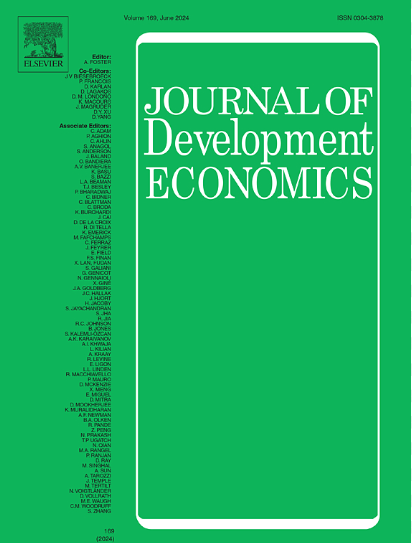对女性创业的持续但可改善的冲击:来自肯尼亚的实验证据
IF 4.6
1区 经济学
Q1 ECONOMICS
引用次数: 0
摘要
尽管女性企业家面临多重障碍,但目前尚不清楚在经济危机期间性别差距是否会加剧:由于这些障碍,女性,尤其是已婚女性,可能比男性受到的影响更大,但由于她们的专业领域,也可能受到的影响更小,或者如果危机使所有人都扁平化。利用在2019冠状病毒病爆发前收集基线数据的独特时机,我们研究了危机发生两年后随机赠款和对男女合作微型企业家进行业务培训的影响。我们发现,妇女受到大流行病的影响更为严重,但赠款极大地帮助减轻了危机对企业所有权、销售、利润、收入和福祉的影响。就影响渠道而言,补助金增加了妇女的劳动力供应,牺牲了家务劳动、休闲时间和照顾孩子的时间,而对男子来说,时间从有工资的就业重新分配到他们的生意上。本文章由计算机程序翻译,如有差异,请以英文原文为准。
Persistent yet ameliorable shocks to female entrepreneurship: Experimental evidence from Kenya
While female entrepreneurs face multiple obstacles, it is unclear whether gender gaps worsen during economic crises: women, especially married women, may be more affected than men due to these obstacles, but could also be less exposed due to their specialized sectors, or if a crisis flattens everyone together. Leveraging on a unique timing of collecting baseline data just before COVID-19, we examine the impact of randomized grants and business training of partnered female and male microentrepreneurs two years after the crisis. We find that women were more severely impacted by the pandemic, but that the grants significantly helped mitigate the crisis impacts on business ownership, sales, profits, income, and well-being. In terms of channels of impact, the grants increased women's labor supply, at the expense of domestic work, leisure time, and childcare hours, while, for men, time is reallocated from wage employment to their business.
求助全文
通过发布文献求助,成功后即可免费获取论文全文。
去求助
来源期刊

Journal of Development Economics
ECONOMICS-
CiteScore
8.30
自引率
4.00%
发文量
126
审稿时长
72 days
期刊介绍:
The Journal of Development Economics publishes papers relating to all aspects of economic development - from immediate policy concerns to structural problems of underdevelopment. The emphasis is on quantitative or analytical work, which is relevant as well as intellectually stimulating.
 求助内容:
求助内容: 应助结果提醒方式:
应助结果提醒方式:


